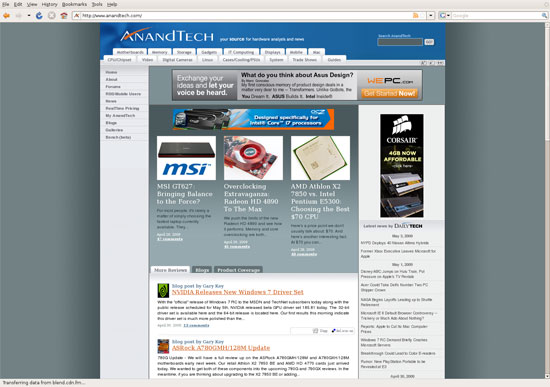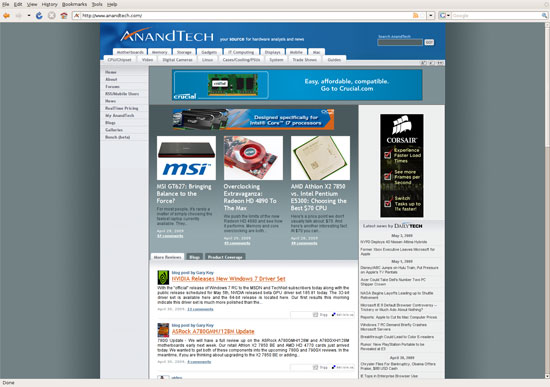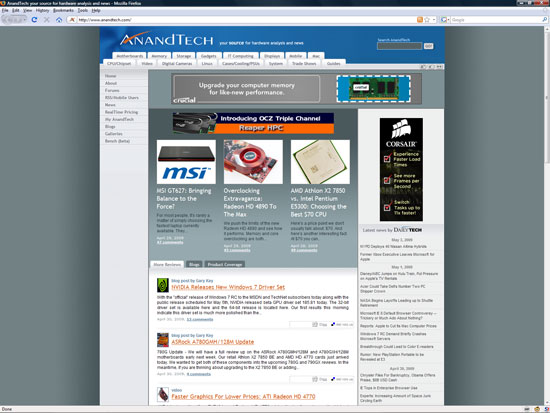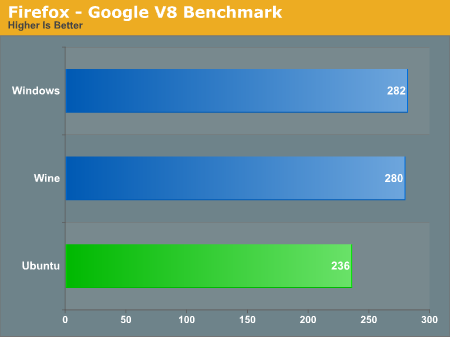Revisiting Linux Part 1: A Look at Ubuntu 8.04
by Ryan Smith on August 26, 2009 12:00 AM EST- Posted in
- Linux
Applications: Web Browsing
Windows Default: Internet Explorer 7
What I use: Firefox 3
Ubuntu Default: Firefox 3
Much to the chagrin of Microsoft, the web browser is turning in to a miniature OS of its own, and in the case of anything that’s not Internet Explorer, it’s a miniature OS that has no allegiance to a real operating system. It’s the primary way to retrieve most information from the internet, applications can be created through AJAX and Flash, video can be watched (see: Hulu). A good cross-platform web browser removes a great deal of the need to use any specific OS, and this is something that works in Ubuntu’s favor.
Ubuntu ships with Firefox 3, Internet Explorer’s loyal opposition and currently the #2 browser on the market. So long as a site isn’t built for IE6 Firefox has great compatibility, good speed, and an army of extensions to add features to it. Since many of you already use it, there’s not a lot to say here: it’s a very solid browser, and something I find to be superior to Internet Explorer.

As I already use Firefox under Windows, the transition here was virtually non-existent. Ubuntu doesn’t have any direct Windows to Ubuntu transition tools, but after moving my Firefox profile from Windows to Ubuntu and reconfiguring a few location-sensitive settings, I was up and going. Internet Explorer users are going to have more of a transition obviously, but it’s not much. All of the major browsers’ core behaviors are the same, which makes it easy to switch among them with little fuss.
At the risk of marginalizing the rest of Ubuntu, I consider Firefox to be one of the core components that makes Ubuntu a success story. Because so much computer use these days is inside a browser, it has become a lynchpin for a good OS. If your browser is bad, then it’s probably hurting the usability of your OS if it means that many users cannot do something they regularly do on another browser. One only needs to look at the early versions of Mac OS X to get a good picture of this, as it shipped with the only-bearable Internet Explorer 5.
There are however a few caveats that I’d like to hit on. Something that continues to throw me for a loop is that while it’s the same Firefox I use under Windows and Mac OS X, it doesn’t necessarily look the same. The rendering engine is the same, but OS differences start to play out here. Mac OS X, Windows, and Ubuntu all render text slightly differently, and in the case of Ubuntu come with a significantly different font set. Because Firefox is at the mercy of the OS for fonts, what you get are small but noticeable differences in how the same page looks.

Firefox with default fonts

Firefox with MS Core fonts

Firefox under Windows
Above we have AnandTech rendered in Firefox 3 on Windows, and Ubuntu. On Windows Firefox uses Times New Roman and Arial for its default fonts, but these fonts do not exist on Ubuntu; rather Ubuntu uses what’s called “serif” and “sans-serif”. This along with how the two OSs differ in font anti-aliasing results in the different look of Firefox under Ubuntu. Having used Windows for a number of years, I have never gotten past the idea of Ubuntu looking “wrong” even though the right look is entirely subjective.
Ultimately I ended up adding the missing fonts by installing the msttcorefonts package, which contains Times New Roman, Arial, and the other “big name” standard fonts. With those installed and Firefox configured to use them, text looks much closer, although not quite the same. It’s a shame that Ubuntu can’t include these fonts by default.
The second caveat is one of performance. When using Javascript-heavy sites in particular, Firefox on Ubuntu seems just a bit slower than under Windows. I had never been able to figure out why until I saw this Slashdot article. Firefox for Linux is not compiled with profile guided optimization, a method of improving the performance of binaries by looking at how they’re used. While Ubuntu compiles their own releases of Firefox, they do the same thing. As a result, there’s a speed difference in Firefox – it’s the same code, but the Windows version is compiled in such a way that it’s faster. As I wrote at the start of this article, I’m not concerned with the performance of Ubuntu or its applications for the most part, and this falls under that notion. Firefox is slower, but not to the point that I care. It’s interesting enough that it bears mentioning, however.
Just to give you an idea of what the speed difference is, here’s a breakout of one of our Firefox benchmarks from the benchmarking section later in this article:

As you can see, in this Javascript-heavy test Firefox on Ubuntu is upwards of 17% slower than it is under Windows. As this performance gap manifests itself largely under Javascript-heavy situations; regular browsing doesn’t show nearly the difference. Flash is also slower, but this has nothing to do with Firefox and more to do with Flash’s mediocre performance under any OS that isn’t Windows.
The last caveat is one of how Ubuntu’s distribution model becomes strained when it comes to Firefox. Ubuntu Hardy shipped nearly 2 months before Firefox 3 did. But because Ubuntu is meant to be a stable platform they still needed to package Firefox 3 with the OS, so Firefox 3 Beta 5 was included. If we had done this article a month after Hardy launched as intended, I’d have few nice things to say. Firefox 3 Beta 5 combined with Adobe Flash 9 was buggy, unstable junk. Canonical made the right decision as the final version of Firefox 3 turned out well, but it highlights the pitfalls of including 3rd party software with the OS.
The flip side of this caveat is that Firefox 3.5.x has superseded 3.0.x as the newest Firefox branch, which means that only 3.0.x versions are being pushed out to Hardy. This means if you want to take advantage of any of Firefox’s newest features such as the new javascript engine, you’ll need to install a 3.5.x build separately, ideally through a PPA package so that it cleanly replaces the default version of Firefox.
But even with those caveats, none of them are serious issues. Firefox 3 is still a fantastic browser and there’s nothing else I’d rather have on Ubuntu.
Final Verdict: Meets My Needs










195 Comments
View All Comments
justniz - Wednesday, August 26, 2009 - link
Maybe I'm missung something but this appears to be a new article.Why are you reviewing a year-old version of Ubuntu? there's been nearly 3 releases since that (Ubuntu is on 9.04 now with 9.10 coming very soon).
Its important to review the most recent version as Ubuntu is totally unlike the Microsoft world in tnat new releases are frequent (Every 6 months) and have real practical improvements.
ioannis - Wednesday, August 26, 2009 - link
I couldn't help myself, but...RTFA!!
:-D
PS: if you read the article, you will also get the joke ;)
nafhan - Wednesday, August 26, 2009 - link
Great article. I look forward to reading the follow up.One comment on security that I would like to make. The commercial Linux vendors (IBM, Novell, Redhat, etc.) are all VERY dedicated to ensuring Linux security, as many/all of their server products use Linux, and changes they make will filter back down to the Linux desktop community. This is something that OSX does not have to nearly the same degree.
My experience with running Linux on the desktop sounds pretty much the same as yours.
-Games killed it in general. I don't usually have a top of the line system. So, I'm usually pushing my computer its limits to run newer games under Windows. Also, I hate dual booting, and most of the FOSS I use is available as a compiled binary for Windows.
-Drivers killed it in one specific instance with an older laptop, as I never got NdisWrapper (required for my wifi cards Windows drivers) to run better than intermittently. I spent way to much time messing with it.
crimson117 - Wednesday, August 26, 2009 - link
[quote]and for the price you’re only giving up official support.[/quote]Ubuntu doesn't have free official support, but neither does Microsoft. Apple does give 90 days free phone support, to their credit, but after that you have to pay.
You can always hire an expert (from ms, or apple, or a third party) to help you, but that's also true with ubuntu, though I expect there are fewer such experts to be found.
MS, Apple, and Ubuntu all offer free web-based help, both community maintained and "officially" maintained.
So I think it's misleading to imply that going from Windows or Mac to Ubuntu means you're downgrading your support options. People overestimate just how "supported" their operating systems are. Also, Linux / Ubuntu releases fixes and updates much more quickly than Apple or MS, so your chances of hitting a bug is lower in the first place. (MS maintains a huge knowledgebase of bugs they haven't bothered to fix yet and might have a workaround for - but I hardly see that as a positive).
crimson117 - Wednesday, August 26, 2009 - link
I'm probably being too hard on Apple here. The genius bar offers free 15 minute appointments to diagnose problems and offer software tips / advice.I'd say apple has the best "official" support, followed by a fuzzy tie between ubuntu and microsoft.
gordonsmall - Wednesday, August 26, 2009 - link
While I have used computers for 20 years or more, I am not a techie. I am much more interested an experience that "just works".When Vista came out I decided to explore the Linux desktop world. I have been using it as my primary system (still keep the dual boot option for XP) for just under 2 years.
I agree that "free" and security are big considerations for moving to a Linux desktop environment. However, there are some other items (and you might class them under security) that I like - because of the file structure, you don't have to periodically defrag your system. Both systems have a lot of updates, but so far I have not gotten the feeling that my Ubuntu system is gradually slowing down and clogging up with a lot of useless files (you don't see a lot of adds for such utilities as Registry Cleaners:). I no longer experience the MS ripple effect - when MS sneezes, other Windows apps may get a cold.
That is not to say that there cannot be issues. My pet peeve has been that my sound has disappeared on a couple of occassions after downloading updates. Using Google, and the Ubuntu documentation, I have been able to get it back up - but wish that wouldn't happen. But Windows updates can on occassion cause some issues.
I think you made a very valid point about the issue of tech support. Google has made a big difference in problem solving.
Enjoyed your review.
Gordon Small
yuchai - Wednesday, August 26, 2009 - link
I've tried using Linux (usually Ubuntu) as a full replacement desktop on and off for the last few years. I've gone back to Windows every time after a while. Some key points:1. For my desktop usage, there honestly isn't anything that Linux does better, in terms of functionality, than Windows
2. Windows is cheap enough that I do not mind spending the money on it. For the $100 that I spent for Vista 64 Home Premium OEM, it is quite worthwhile even if I only use it for 3 years. Yes, there are more apps out of the box for Linux, but it's usually easy to find freeware for Windows with the same functionality. Even Office is now pretty affordable with the Home & Office version.
3. Games - Wine just doesn't cut it. When I want to play a new game, I want buy it and play it immediately! I do not want to have to do research to see whether some game would work on Wine even before I buy it. I do not want to spend hours troubleshooting on the internet if something doesn't work right.
4. There's always something that you want to change in Linux that you can't figure out. Yes, usually the solution is on the internet. And I used to even enjoy spending time and looking for the solution. But, it eventually grew old. Now I just want things to work and keep working.
Note that I do love Linux and actually have a server that doubles as a mythtv HTPC setup. It's a beautiful thing. I am comfortable with shell commands and frequently use SSH to perform multiple functions remotely. My opinions above is purely based on desktop usage.
cciemd - Wednesday, August 26, 2009 - link
Great article, Ryan! Putting out some well written Linux articles really adds depth to your site. I have been reading this site daily for years and this article is prompting my first post.For future articles it would be great to see some Linux benchmarks in most of the hardware reviews. There are some excellent tools out there (check out http://www.phoronix-test-suite.com/)">http://www.phoronix-test-suite.com/). This would also give some closer apples-to-apples comparisons for Mac vs. Linux performance. I for one would LOVE to see SSD articles report some Linux (and Opensolaris/ZFS) benchmarks along with all the Windows tests.
Users often don't realize how much they benefit daily from open source software. I don't think most Mac users realize all the OSX pieces that are used in the background for which Apple leverages open source code (Samba for SMB access and sharing, Webkit for Safari, etc.). Home NAS and enterprise storage which serve files in Windows environments are often *nix based.
It is also a myth that open source means that developers aren't paid. Most enterprises recognize that implementing even commercial apps can require considerable internal development manpower. If enterprise developers can utilize open source code internally and contribute back to the code base, the companies save considerable money and benefit from a healthy software development ecosystem. There are thousands if not millions of developers employed to work on open source code.
Please keep up the good work. I am looking for your next article.
Ryan Smith - Wednesday, August 26, 2009 - link
Unfortunately the Phoronix Test Suite doesn't work under Windows, so it's of limited utility. It's something we may be able to work in to hardware reviews, but it's not really applicable to OS reviews.chrone - Wednesday, August 26, 2009 - link
what i'd like to see on the next ubuntu version is more softer and smoother graphic and font rendering. i hate the way gnome renders the graphic and font. they look old operating system. using the ms core font some how helps but not much.i know there's compiz and friends, but i just wish it comes by default, so no need to hassle with compiz and its setting. i wish it could be rendered softer and smoother such as in windows and mac osx.
the look and feel should be tweaked more often! :D